
Psycho-match Protocol of a Winner:
How I Became Mentally Tough
by Werner
Knobloch, Certified Coach of Tennis Psychology and Dr. Roland A. Carlstedt
Foreword
How often do we actually follow the results when players try to
put advice or tennis tips into practice in actual matches? What goes
through a player's mind when ahead or behind in a crucial match. How does a
person apply the techniques learned to help deal with stress, fatigue, or
overconfidence for that matter.
The following diary provides a unique insight into the mental processes of a
nationally ranked senior player in Germany, Werner Knobloch, who frequently
lost matches due to on-court psychological problems. Rather than resign himself to being mentally weak or unprepared forever, Wolfgang became
proactive and searched for a way to attack his shaky match psyche. He enrolled in the American Board of Sport Psychology
certification program where he was mentored by Dr. Roland A. Carlstedt.
There he learned how to approach the mental game using the Carlstedt Protocol.
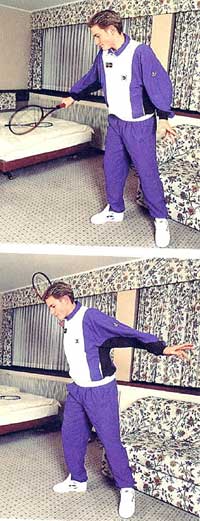
Christian Thieman, former Top-10 German Junior,
engages in Active-Alert hypnosis before a match. Werner used this
technique to climb in the senior rankings and experience his best
season ever.
|
Werner's diary was written during an incredible transformative tennis season in
which this former Bundesliga professional soccer player went on to defeat his
major nemesis, attain his highest national ranking ever, and lead his tennis
team to a long sought after title, something he directly attributed to his
systematic mental training.
In addition to Werner's accounts of how he developed and strengthened his mental game, the
diary includes insightful comments from Dr. Carlstedt regarding the nature of the process
and how Werner made it work for him.
Diary of Werner Knobloch
Pre-Match Warm Up
Psychological and motor system warm-up in an attempt to get off to a better start instead of merely hoping to
find my "best-form" and feeling out my opponent. My new motto: "take matters into my own hand, full of
confidence and optimism." Play my aggressive style of tennis without fear. That means going for my returns
and passing shots from the get go to unsettle my opponent.
Analysis: Werner is engaging in a cognitive strategy to activate himself prior to his match. Positive thoughts
centering on a specific game plan can help a player get off to a good start and maintain focus.
Bremen versus Barsinghausen
Match 1: Indoor Team Tennis Event Regionaliga (Highest class in the German Senior league) 55 senior age group.
a) One hour before my match I begin with mental training. I'm sitting in a quiet corner with my eyes closed,
visualizing the technical patterns of my strokes. b) 15 minutes before my match I
go through the same visualization process combined with shadow strokes. Thereafter, I go through entire technical and tactical
movement patterns to simulate the strokes and tactics I plan on carrying out in the match without a ball (active shadow stroking).
Analysis: Werner is engaging in a process that actually can lead to a state of self-hypnosis. The type of
self-hypnosis he is achieving is called Active-Alert hypnosis something I will elaborate on in a future article. AAH is an excellent way to get in the Zone from the get go.
On-Court Warm-up with Opponent Prior to Match
After preparing mentally and especially after doing Active Alert Self-Hypnosis I experience a calm and
consistency when warming-up that I have seldom experienced. Usually I need a certain amount of time to get to that "place" (the Zone).
Playing the #13 ranked player in my region I play out of my mind and win the first set 6-0! In the 2nd set, after
playing so well and leading, I start to lose that feel a little bit, I get a little careless, and the next
thing I know I'm down 2-3. Time to regroup. At the changeover I stay seated beyond the allowed time,
keeping my eyes closed, concentrating on my leg muscles, envisioning that new energy is flowing upward and
lifting me into the next game. With new found mental strength I regain the form I briefly lost and go on to win
the 2nd set and match. Our team won the total competition as well, 5 matches to 1.
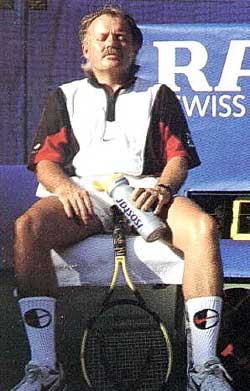
Werner practices visualization techniques prior to the match and during changeovers
|
Analysis: Werner used the "time-out" method to regroup after noticing he was losing his concentration.
Crucial here is that he recognized he was getting sloppy and overconfident. Fortunately, he used the
changeover to refocus, using visualization as a post-active-alert hypnotic cue to get back in the Zone.
Match Against Otterndorf
I repeated the routine I recently learned in the certification course encompassing mental and physical warm-up
and my complete visualization and active-alert routine.
The match progresses similar to my last one, I start great and win the first set easy 6-1.
I notice that this time I don't seem to let up mentally, the psychological preparation I engaged in seems to hold
longer and I have no problem closing the match out in top form, winning the second set 6-0, with our team
winning 4 matches to 2.
After my match I was asked by teammates and opponents to what I attributed
to my noticeable overall improvement from last season, especially my new found mental toughness? My response, I
directly attributed my new mental game to the protocol I learned in the certification program I completed under Dr. Carlstedt (Note: Werner is a full-time teaching pro who was interested in learning about Tennis Psychology). I went on to tell my team mates and opponents that I can only credibly teach the mental aspects of the game by going
through the process and experiencing the protocol and its effects first hand.
Analysis: Werner has a great attitude. I was amazed with his approach to both his profession and his own
game. Obviously being a former professional soccer player instilled an incredible competitive drive in him and
even as a player in the 55s he wanted to get all he could out of his game (By-the-way, the national level 55ers
in Germany are very good and still play at the 5.0 to 5.5. level).
I should also mention that Werner astutely noticed that the mental training efforts he made had an impact almost immediately and progressed linearly
over time. That is, the more he trained psychological techniques the longer his concentration intervals became. His self-control and ability to regulate his nerves and stress also
increased significantly.
The lesson: You have to train your mind as you do your technique, tactics, and physical fitness, but you have
to do it systematically, and should engage interventions (mental training techniques) that are scientifically
validated. You also need to monitor and analyze your efforts, preferably with an ABSP Certified or Master
Coach of Sport Psychology or Board Certified Sport Psychologist.
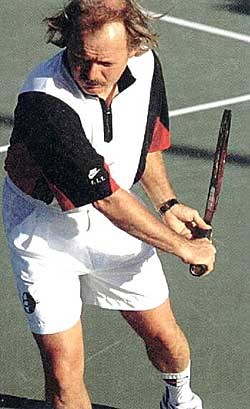
My psychological preparation seems to hold and I have little
trouble maintaining my form
|
Match Against Klipper Hamburg
Playing the #8 55er in the German National Rankings, a former World-European and German Champion. If that doesn't make you nervous I don't know what will!!!
Preparation as usual (see above).
I got off to a great start winning the first set 6-2. Then things started to turn. The Champ got better and better,
until at 3-3 in the second set, I encounter a break point, he saves it, and goes on to win the game to take a 4-3 lead. He then breaks me after I lead 30:0, and serves out the second set. Despite 2 break chances in
the final set I end up losing 3-6 in the third. He beats me again, RATS!
After the match, in spite of the outcome, I receive much praise. But I wanted to win and should have beaten
him. You can't take praise to the rank-bank. What to do! According to
'The Protocol', I've got to analyze and dissect my match, even if I had won.
Here's how I saw it. I amazed myself after winning the first set against a champion I had never taken a set off
of before. I fell into the fatal trap, overconfidence and the belief I was too good. What happened then was I let up again (like in the first match above). Only this time I could not recover against a classy and experienced
opponent. I swore, this would not happen again.
Analysis: I like Werner's last statement. He sets a goal and he has learned the mental skills needed to achieve
it. Again, it's a matter of practice. Werner recognizes a problem (he tends to slack off when ahead and
become too confident), but since he has newly learned tools, he can well expect to deal and reduce or even
eradicate the problem with continued systematic psychological training.
Match Against TC Muerwik
Mental preparation as always, only this time abbreviated due to factors I couldn't control (venue, noise, etc.)
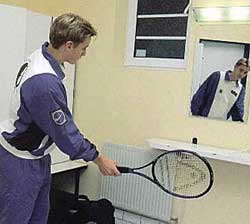
Preparing mentally in the locker room can kick-start you into a match.
|
Playing the #52 ranked 55er we both play a very good match staying even until 3:3, however, then I decide
to turn it on by getting more aggressive, attacking when I can, without fear of making mistakes, I successfully
return serve hitting risky shots, staying calm when passing, and serve it out to win the first set 6:3.
Interestingly, at the set changeover, I catch myself without trying, remembering my past letdowns. I vow not
to let this happen again. Sure enough, I break to go up 1-0 in the second set. But then again
my tennis-pathological tendency to let up occurs again, thinking my opponent is toast, and what happens, he breaks back and before long I lose the set 4:6.
What happens then hadn't happened all season. I get extremely mad (Dr. Carlstedt would tell you my heart
was accelerating instead of decelerating (Mind
Your Heart).
Despite intense efforts to refocus I cannot regain my form and even experienced technical problems I thought
no longer existed, I just totally lost it and the third set (3:6) and the match.
After the match, I again swore never to let this happen again
Analysis: Here we observe a common occurrence in which a player
just gets overconfident. This appears to be Werner's mental Achilles
heal, something he will have to constantly work on and monitor. I'll
say it again, you have to work on the mental game as you do the rest
of your game, at times even more so if you have a particular problem
that continues to reoccur. In Werner's case I would recommend working
on exceeding thresholds, forcing him to over-train and expand his
concentration tolerance intervals so that he doesn't "lose
it" prematurely. This can be a long process. But he will have to
work through it.
One other thing about Werner in this match. His mental preparation routine was altered and cut short. In the
learning phase of a mental training program it is crucial to stick to the learned routine. Werner
should have went outdoors or wherever to get his full mental preparation session in. Doing so can be critical. The same
applies whenever there is a major interruption in play say a rain delay, and even during changeovers especially if you are having problems.
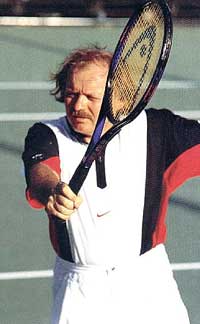
Against TC Muerwik my tendency towards overconfidence and lack of control led
to my defeat
|
I once saw the eccentric player Torban Ulrich a contemporary of Pancho Gonzales
stay on the court during a changeover in a senior event in Colorado Springs in which he was losing
to Gonzales. On top of that, he actually practiced his volley off the back wall while waiting for play to resume. He went on to beat Pancho in that match.
Match Against Condor Hamburg
I do my pre-match visualization routine, but cannot warm-up as usual since no free courts are available
(NOTE: in such a case I recommend going outside in the parking lot, field or any free space. I do this with
professional players and remember that Ronald Agenor liked doing this....active-alert hypnosis/shadow
strokes and tactic patterns.)
Nevertheless, despite limited preparation (am I being overconfident again?) I have no problem getting to that
quiet place and starting good. And, I'm only playing the # 72 in Germany.
However, no problem today. I win easy 6-1, 6-0
Analysis: Here Werner's self-confidence was consistent with the reality of the situation, his opponent, his
own ability and appraisal of the task. Werner stayed within his comfort zone and played the way he could to
achieve a routine but necessary win after the loss of last week.
Regional Championships - Nordwest German Tennis Association Selected Team
I'm seeded # 2 behind Gunther Bernhardt the National # 13 ranked player
I win in the 16s 6:1, 6:1, in the quarters 6:0, 6:2, and in the semis against the German # 78, 6:2, 6:4.
Now comes the BIG ONE. I face the # 1 seed, the aforementioned G. Bernhardt, against whom I have lost
12 times without ever winning a set.
The evening before the final I start thinking about the art of using the right strategy. Since I haven't beaten this
guy in 10 years, let alone win a set, obviously I have failed to implement an ideal tactic to beat him.
Consequently, I decided on the following game-plan:
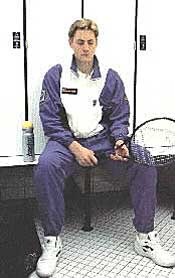
Visualization before a match can help you maintain focus during critical
points.
|
- Hit safe deep balls, if I encounter a short ball, approach to the net at his backhand.
- Hit my first serve to his backhand, playing serve and volley. Having observed him in the semis, I knew
that he almost always passes down-the-line with his backhand...and I'd be ready to counter.
- While laying in bed I visualized my tactics. I imagined going to the court, I saw myself attacking his
short balls, approaching the net and putting away the volley. I saw myself serving to his backhand and
winning the point with a well placed volley.
I fell into a long deep sleep, confident I was ready.
The Final
My usual complete mental preparation routine.
What a start, I'm up 5-1 in no time (remember I haven't beaten this guy in 10 years, never winning even a
set). But then all of a sudden, that "mental monkey" on my back, I'm actually thinking I'll beat this guy easy,
and what happens, I lose 3 games in a row. However, I pulled myself together and just manage to win the set
6:4, my first set in 10 years against this guy, YEAH!
In the second set we play pretty equal but in a moment of inattention he manages to break me and wins the
set 6:3.
I decided to use an allowed 10 minute break, went to the locker room, changed my clothes and went through
the technical visualization routine I learned in the certification course. Unfortunately, he still got off to a better
start going up 2:0 and 40:15 for 3:0. He was playing so confidently leading me to think I'd embarrass myself
and lose 6:0. Suddenly though, a Eureka moment, an epiphany in which I became inspired occurred....the
negative thoughts vanished, replaced with the following: "You
Will Be In the Right Place At the Right Time and Will Be Successful!"
Sure enough, I broke for 1:2, my game became more forceful and I pulled away to go up 4:2. At 40:15 on his
serve (2 break points) I could already see me serving for the match, but alas, he held on for 3:4.
At the changeover I used methods I had learned to help prevent negative thoughts from entering my mind in hopes of
programming the mental fortitude I would need to see this match to a successful conclusion.
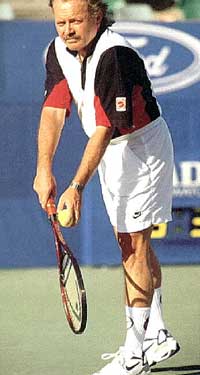
Despite the pressure, I was able to serve out the match against
someone I had not beaten in ten years.
|
It worked! I remained mentally calm, thinking my game would get progressively better, and it did. I held.
Then he held.
I was serving for the match at 5:4. I did it. I served the match out winning 6:4 against someone I had not
beaten after 10 years of trying, what a feeling!
Numerous tennis experts congratulated me after the match. They had never seen me perform at the level I had
displayed.
My victory took on even more significance when Gunther Bernhardt went on to become North
Germany Champion defeating the #s 3 and 8 in Germany on the way to the title.
I attribute my incredible season to the Carlstedt protocol and look forward to next season.
In the meantime after doing a reevaluation of where I was and am now I can conclude that my mental game
has become much more stable which in turn has made me a more consistent player technically and tactically.
I'm on the right path.
I feel very, very, good about my new mental toughness!
The mental blocks are gone, now I just need to practice mentally to maintain my psychological level. I can do it, because we are what we do and practice. Ability equates with practice.
To achieve satisfaction one needs patience, but one should also remember the small incremental
gains go a long way toward giving one the courage to continue on that rocky path to success and contentment.
Analysis: What a philosopher and insightful player Werner Knobloch is. He essentially set a goal for himself,
using a certification in Tennis and Sport Psychology to learn mental training techniques that would help him
fulfill his tennis aspirations. The mental approach is also an intellectual one, which Werner illustrates in his
diary. Although some of Werner's musing may seem simplistic you must remember, simple thoughts can be
used as cues to implement that which one has learned. In the case of Werner, he learned the skills and had the
tools, so that in a crisis he was able to regroup and call upon techniques to boost his concentration, lift his
motivation, and maintain control over his nerves to activate the best of his technical and tactical game.
This article was translated by Dr. Roland A. Carlstedt who mentored
Werner in the American Board of Sport Psychology certification program in
which this top-German senior player also learned how to improve his own
mental game. Psychology certification program in
which this top-German senior player also learned how to improve his own
mental game.
For more information about the CARLSTEDT PROTOCOL click graphic or email him at:
DrRCarlstedt@aol.com
 TennisONE is pleased to welcome Dr. Roland A. Carlstedt to our family of
contributors. Roland, a Board Certified Sport Psychologist and Tennis Coach
earned his Doctorate (Ph.D.) in Psychology with Honors from Saybrook Graduate
School in San Francisco under the renowned Personality Psychologist and
Behavioral Geneticist Dr. Auke Tellegen of the University of Minnesota. Dr.
Carlstedt's dissertation on neuropsychological processes in highly skilled
athletes (700) from 7 sports including tennis is being nominated for the
Society of Neuroscience's Annual 2002 Lindsley Award for Best Dissertation in
Behavioral Neuroscience. Dr. Carlstedt is listed in the American psychological Association's Directory of Experts in Sport Psychology. TennisONE is pleased to welcome Dr. Roland A. Carlstedt to our family of
contributors. Roland, a Board Certified Sport Psychologist and Tennis Coach
earned his Doctorate (Ph.D.) in Psychology with Honors from Saybrook Graduate
School in San Francisco under the renowned Personality Psychologist and
Behavioral Geneticist Dr. Auke Tellegen of the University of Minnesota. Dr.
Carlstedt's dissertation on neuropsychological processes in highly skilled
athletes (700) from 7 sports including tennis is being nominated for the
Society of Neuroscience's Annual 2002 Lindsley Award for Best Dissertation in
Behavioral Neuroscience. Dr. Carlstedt is listed in the American psychological Association's Directory of Experts in Sport Psychology.
He is currently an Assistant Psychologist and Post-doctoral Resident in
Clinical and Neuropsychology and the Chairman of the American Board of Sport
Psychology. Dr. Carlstedt is also available for coaching, consulting, and seminars/speaking engagements and psychotherapy.
|









 TennisONE is pleased to welcome Dr. Roland A. Carlstedt to our family of
contributors. Roland, a Board Certified Sport Psychologist and Tennis Coach
earned his Doctorate (Ph.D.) in Psychology with Honors from Saybrook Graduate
School in San Francisco under the renowned Personality Psychologist and
Behavioral Geneticist Dr. Auke Tellegen of the University of Minnesota. Dr.
Carlstedt's dissertation on neuropsychological processes in highly skilled
athletes (700) from 7 sports including tennis is being nominated for the
Society of Neuroscience's Annual 2002 Lindsley Award for Best Dissertation in
Behavioral Neuroscience. Dr. Carlstedt is listed in the American psychological Association's Directory of Experts in Sport Psychology.
TennisONE is pleased to welcome Dr. Roland A. Carlstedt to our family of
contributors. Roland, a Board Certified Sport Psychologist and Tennis Coach
earned his Doctorate (Ph.D.) in Psychology with Honors from Saybrook Graduate
School in San Francisco under the renowned Personality Psychologist and
Behavioral Geneticist Dr. Auke Tellegen of the University of Minnesota. Dr.
Carlstedt's dissertation on neuropsychological processes in highly skilled
athletes (700) from 7 sports including tennis is being nominated for the
Society of Neuroscience's Annual 2002 Lindsley Award for Best Dissertation in
Behavioral Neuroscience. Dr. Carlstedt is listed in the American psychological Association's Directory of Experts in Sport Psychology.